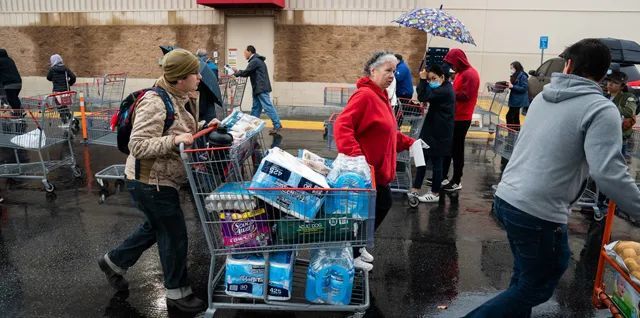为什么人们会在疫情期间囤积卫生纸?| 有声双语
疫情之下,各国民众在防疫的同时也开始抢购食品和生活用品。令人始料未及的是,在这场抢购潮中,最先出现全球性紧缺的并非粮食等物资,而是卫生纸!在日本、美国、英国等地,卫生纸都成了最抢手的物资。那么,卫生纸怎么就成了抢手货?
Many people in the West stockpile toilet paper amid the pandemic. CHINA DAILY
↑↑点击播放音频↑↑
Being in the midst of a pandemic lockdown can make people feel worried. But nothing has exemplified this panicky behavior more than hoarding, specifically toilet paper.
疫情封城期间会让人们感到焦虑。而囤积物资,尤其是卫生纸,则是这种恐慌行为的最典型的例子。
Seemingly transcending borders and cultures, people from all over the world, including the US, UK and Japan, have been clearing supermarket shelves primarily for this necessity. But what’s the reason for this sudden toilet paper fixation? You can understand panic buying food, but do we really need this much toilet paper?
包括美国、英国、日本在内的世界各地的人们都在超市抢购这种生活必需品,这种现象似乎跨越了国界与文化。但为何人们突然之间会对卫生纸如此狂热呢?抢购食物还能让人理解,但我们真的需要这么多卫生纸吗?
Steven Taylor, author of the book The Psychology of Pandemics, told the Independent that our toilet paper hoarding is a product of our disgust. During a pandemic, people’s sensitivity to disgust increases, like when you flinch if someone nearby sneezes.
《流行病心理学》一书的作者史蒂文·泰勒在接受《独立报》采访时表示,卫生纸的囤积行为是人们反感情绪的产物。疫情期间,人们变得更加敏感,比如你会避开旁边打喷嚏的人。
“Disgust is like an alarm mechanism … and what better tool for eliminating disgusting material than toilet paper. I think this is how it became a conditioned symbol of safety,” he said.
“这种反感就像是一种警报机制……而卫生纸则是消除这种反感情绪的最佳工具。我认为这便是卫生纸成为当下一种安全象征的原因,”他说道。
Writing for The Conversation, Niki Edwards of The Queensland University of Technology said, “When people hear about the novel coronavirus, they are afraid of losing control. And toilet paper feels like a way to maintain control over hygiene and cleanliness.”
来自昆士兰科技大学的妮基·爱德华兹在为“对话”网站供稿时表示,“人们在听说了新冠病毒的消息后,害怕一切会失控。而(用)卫生纸或许是一种能够掌控清洁卫生的方式。
Another one of the most prominent reasons behind this toilet paper trend, according to the BBC, is the snowball effect. Due to its prominent coverage, both in the news and social media, people naturally ask, “Will there be enough toilet paper for my family and me?” This invariably leads to more people following the crowd and buying toilet paper because of their fear of missing out.
英国广播公司认为,这股“卫生纸潮”背后的另一大原因是滚雪球效应。由于新闻以及社交媒体对卫生纸抢购现象的大肆报道,人们自然而然会问:“我和我的家人还能买到卫生纸吗?”这会令更多人随大流购买卫生纸,因为他们害怕会买不到了。
“Fear is very contagious. So when those sorts of things go viral, when you see people around you buying things in a panicky way, it’s going to make you feel more anxious,” wrote American psychologist Baruch Fischhoff for CNBC.
“恐惧是会传染的。因此,当这类事情引发关注,当你看到周围的人都在恐慌抢购时,你会觉得愈发焦虑,”美国心理学家巴鲁克·费斯科霍夫在为美国全国广播公司财经频道的供稿中如此写道。
While there are, of course, selfish people who stockpile just because they can, it’s worth keeping things in perspective. Remember, just as countries are cooperating to find a vaccine, we must cooperate to ensure that everyone has their share of necessities.
尽管总有些自私的人有能力囤积物资,但我们应当正确地看待事物。要记住,各国都在积极合作研发疫苗,而我们也应携手确保人人都能获得生活必需品。
以上文章英文内容选自《21世纪学生英文报》高二787期
本文英文音频由我报外籍编辑 Joe Willetts朗读












